Note
Sensei! How does kanji naming works? Say I'm trying to find a kanji writing for the name Karou, how should I go about it? Thank you, and have a nice day!
Hello!! This is a good question, and one that a lot of people have! I'm gonna take some time to answer this both in the context of "naming a character/oc/something fictional" and in the context of "finding a kanji reading for my real name"!
In terms of more abstractly answering the question of how kanji naming works, I'll try and be quick and not get super deep in the weeds or the history of naming conventions in Japan. As is typical of names across cultures, there are two parts of a name: the surname and the given name. Remember that in Japanese, the surname comes before the given name. The surname (or last name) is gonna be the family name, which I usually see a lot less interest in from a character creation standpoint, so I'll be prioritizing given names in my explanations. However, you can use a lot of the same methods I'll talk about later on to find or create surnames!
Generally speaking, seeing a name written in kanji gives you virtually no information about how it is actually pronounced. This is because, in the context of names, kanji can have tons more readings than they have in normal contexts. Many kanji have a larger number of potential readings when used in names, and you also have the trend of kirakira names (キラキラネーム), which are names that use unique readings (or I think even invented readings in some cases??? I don't know that for certain though) of kanji to make that name even more unique. This is part of why business card exchanges are such a big thing in Japan! You can see how the name is written in kanji and see the furigana showing you how to pronounce it so you don't mess either of those two things up in future correspondences.
Basically, all of this to say that finding kanji for a name can be a pretty open process, and you can exercise some creative muscles when looking for good kanji to use! Even in real life, outside of places like novels or anime where characters are very intentionally named, people will choose kanji combinations based on how good they sound, the meanings of the kanji, and how visually pleasant they look together, so you can absolutely let those things factor into picking a name!
Speaking of how characters are named in media, I will add one more thing: the kanji used for names in a lot of pop culture media is pun- or wordplay-based. If you look at the names of characters in a lot of popular anime, manga, and video games, you see that a lot of their name kanji's meanings will be somehow referential to a characters personality, or powers, or role in the story. When naming your own characters and picking out kanji, you can absolutely lean into this because it's a huge part of the creative process of naming characters in lots of pop culture media!
In terms of finding a way of writing a non-Japanese name in kanji, the process is honestly pretty similar! A lot of people I know have had Japanese friends give them suggestions/bestow upon them a kanji writing of their name, but in general there are two methods: get a kanji combination that sounds, roughly, like your name (basically taking the katakana pronunciation of your name and finding how you could construct it using kanji) or find a kanji compound that matches the meaning of your name/matches your vibes, even if it isn't necessarily read in a way that sounds like your name (but, similar to kirakira names, you can put your name reading as the furigana for the kanji compound).
You can find information on the first option by searching up "ateji", which are characters that are used for their sound with little regard for meaning. The kanji that are used to construct the "fancy kanji spellings" of country names are a good example of this! The meanings aren't taken into consideration nearly as much as the sounds are. There are also native Japanese words that are like this, because they weren't originally written using kanji and were just assigned some based on sound! But this is getting off-topic.
The second option I see far more frequently in the "bestowed upon you by a native speaker" category, but basically involves taking information about your name's meaning, your personality, interests, career, and other details about you, and looking for kanji that align with some aspect of you. Generally people are gonna make an effort to make the compound read as similarly to your name as possible, but like I said above they won't necessarily, and I know a couple of people whose kanji names wouldn't be intuitively be read in a way that sounds like their names.
Your second question, about how to go about finding a writing for a specific name, is gonna be a little bit different than just the abstract discussion of how it works. A lot of my friends have asked me the same thing, so I've got a couple of methods that I can recommend. However, I am obviously learning Japanese as a second language, so I'm sure there's some methods/information I'm missing in this answer! I'll mention some things specific to character-naming here, but the resources themselves can generally be used for both finding a kanji transliteration of your own name and naming a character!
Alright!! Now to offer the resources that I will usually recommend and use:
Use baby name finder/character name generator websites,
Baby name sites, in my experience, are pretty popular for finding character names in general, so I'm guessing a decent amount of people are familiar with the method! Character name generators are also pretty popular in my experience, and can be a good backup if you don't have anything specific in mind. You can use either baby name sites or character name generator sites the same way you'd use them for other character names that aren't written in kanji! The difference here is obviously that you'll be looking at which specific kanji the name is made of, but a lot of name sites will provide multiple possible kanji combinations for one name.
If you know enough Japanese to navigate a website, you can use some Japanese baby name sites like these:
https://b-name.jp/
https://sp.babynames.jp/
Which can provide both lists of baby names based on popularity and provide name searches/name generation based on search terms you put in. These, and other sites like them, often let you search for specific kana sounds, then provide some kanji compounds that align with what you're searching for (either starting with, ending with, or including the sound/sound combination you've put in). You can also find kana sound searches that allow you to sort based on the kana the name starts with, as in the second site I've linked. These are more helpful if you have a first sound in mind, but nothing else, and they can take a long time to scroll through because they'll provide pretty much all of the popular kanji combinations for each given name. If you like just scrolling through names for fun/inspiration/etc., it'd probably still be a pretty good time! These are basically the same as using an English baby name search site, so if you know some rudimentary Japanese and can read kana + some kanji you can use this method for some great results!
If you don't know any Japanese, that's totally fine-- some English-based name search sites, for example https://www.behindthename.com/ , provide the kanji for Japanese names they have in their databases. I'd say these are probably the next best thing! You have to be a little more conscious of where they're sourcing the name so you know if you're referencing an existing fictional character with the name, since fictional characters are usually a part of user submitted name lists (although I would say be aware of this finding any names through resources that allow user submissions, not just names written using kanji). On sites like these, you can search for the sounds you want the same way you'd search for them in any other language, and just limit the results to Japanese names.
In terms of character name generators, my top suggestion would be both the Japanese- and English-based versions of the Super Japanese Name Generator, found at https://namegen.jp/ and https://namegen.jp/en respectively! Friends of mine have told me they've had luck using both versions, and it provides lots of good information for each name it generates! It also generates both surnames and given names, which can be useful!
If you can read/understand some basic Japanese, you can find lots of other options by looking up search terms like "キャラクター名前メーカー"; I think you could probably find some English-language generators too, but I've had way less success finding English-based generators that actually provide kanji for the names.
2. Use a dictionary
https://jisho.org/ is a really popular online Japanese dictionary, and it has a whole subset of name-related tags you can add to your searches to specifically try and find names that begin with, end with, or contain the sounds you want. In my experience, I've had more success when typing the sounds out in kana, but in most cases you can still get a lot of results even if you don't! This is probably gonna be one of your best options if you don't speak any Japanese, because the navigation for the site is all in English, and you can click on the details of the individual kanji to see their English meanings.
There are some other sites out there which are name-focused catalogues, however the only ones I know of are entirely in Japanese (https://myoji-yurai.net/ is the main one I can think of off the top of my head), but generally these are more beneficial for pulling up the readings of a kanji you already have identified, not so much for finding kanji for sounds you have in mind.
Obviously some of these resources are gonna be less accessible if you don't know any Japanese, so I apologize for that, but I hope my answers were able to help you out a bit anyways!!
28 notes
·
View notes
Text
Apps/sites for learning Japanese
Can't believe how high quality these free resources are!
Last updated: 2025-01-05
コース
Minato
Free high-quality interactive self-guided courses. It also has live courses (I haven't tried it yet).
Preview
TUFS Language Modules
From Tokyo University of Foreign Studies.
The English version currently only has the pronunciation and dialog modules, so I'm studying the Traditional Chinese version.
Features
Vocabulary list by topics (Chinese)
Dialog
Pronunciation guide
辞書
Kakimashou
Features
Stroke order
Tone
Preview

Jisho
Super clean interface
Features
Tone
Has JLPT tags
Lots of sentence examples
アプリ
Miraa
The Miraa app makes it easy to listen and repeat (the shadowing/echoing technique).
It has a paid version, but I find the free version to be good enough
Features
Can directly paste links from YouTube
Can ask AI for an explanation of words/sentences you don't understand
Has search built in to search for podcasts in Japanese
renshuu
Also available as a web app
その他(た)のツール
Google - Text-to-Speech AI
Useful for reading out my transcripts. It already sounds much more natural than I do, so I can import it to Miraa and shadow my writings.
10ten Japanese Reader (Rikaichamp)
This is a Chrome extension that I use. I used to use Yomichan and then Yomitan after Yomichan sunsetted. But I personally like 10ten's UI.
Preview

457 notes
·
View notes
Text
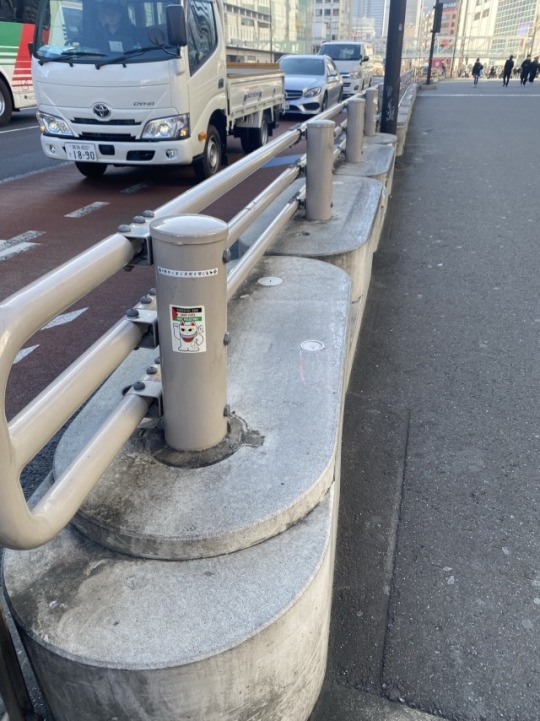
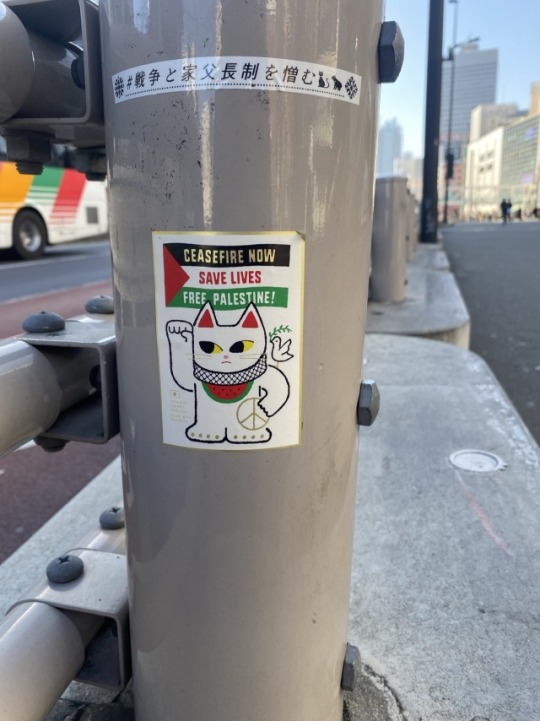
Back today with something different: some stickers spotted near JR Shinjuku Station. The top one reads #戦争と家父長制を憎む.
戦争 [せんそう] means war.
家父長制 [かふちょうせい] means patriarchy. - To break down a big word, sometimes it's best to start with a suffix. 制 (which is new to this blog) means system, law, or rule. It is always read セイ. - Next, the first character, 家, means one's home or family. The second, 父, means father. Combine them and you get 家父 [かふ], meaning one's father (not commonly used in speech). - Finally, 長 can mean chief, leader, or head. Combine it with 家父 to get 家父長 [かふちょう], meaning patriarch. - Putting it all together, 家父長制 means a system of patriarchy, or a system run by the father/men.
憎む [にく.む] is the verb to hate or detest.
How best to translate the whole statement is pretty context dependent. "[I] hate war and the patriarchy" is faithful, but decidedly milquetoast wording for an act of protest. I think we can say that the spirit of the statement is more along the lines of "Fuck war and the patriarchy." (And "fuck ___" doesn't really translate directly, so that may have been what they had in mind anyway...?)
The other sticker shows a 招き猫 maneki-neko (beckoning cat or lucky cat) beneath a Palestinian flag, whose stripes read "Ceasefire now / Save lives / Free Palestine!"
The cat's right paw is drawn to look like a raised human fist. On his left side, there's a dove holding an olive branch perched on his shoulder and he has a peace sign in his paw. He's wearing a collar with a keffiyeh pattern and its tag(?? I think) is a watermelon.
(Also, the colors of the sticker perfectly match the bus driving by in the background, which is very pleasing to me. Even the cat's eyes are accounted for!)
474 notes
·
View notes
Text
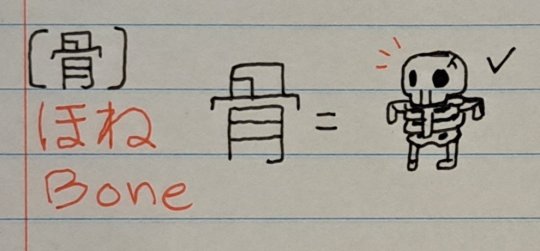

I just realized that the kanji for bone, 「骨」, looks like a little skeleton fella, and I can't get over it...
50K notes
·
View notes
Text
他
音読み おんよみ タ
訓読み くんよみ ほか
英語 えいご other, another, the others
自然は、環境面での危険に対しては他の防御を与えている。 しぜん は、かんきょうめん ��の きけん に たいして は ほか の ほうぎょ を あたえて いる。 Nature provides other forms of protection against environmental dangers.
6 notes
·
View notes
Text
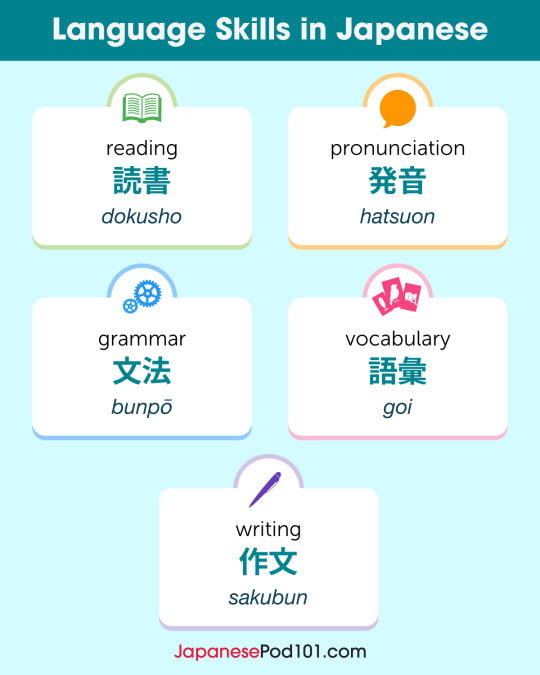
Language Skills in Japanese ⚙️ PS: Learn Japanese with the best FREE online resources, just click here https://www.japanesepod101.com/?src=tumblr_infographic_skills_062425
13 notes
·
View notes
Text





Tested on scrap paper how many kanji I can remember and marked mistakes and difficult ones on note app.
I started mixing up some I already had learned after remembing finally 電 でん and 書く かく.
Made progress but went backwards also, bit frustrating but I started to get hang of it. For dense looking kanji my memory blurs the middle part and I remember outer shape or easiest detail but not fully.
Previously I started always rehearsing from the start all over again so seems like I learned unbalanced and increased weaknesses instead of analysing which was challenging and focusing there more. This time I do it other way to fill the gaps.
0 notes
Text
How to ask "What is the difference between A and B?" in Japanese
I think it's time to write down this phrase and I always ask my Japanese teacher in English and I should stop.
Sentence structure:
「A」と「B」はどう違いますか?
「A」と「B」の違いは何ですか?
For example for asking: What's the difference between 勤める and 働く?
「勤める」と「働く」はどう違いますか?
「勤める」と「働く」の違いは何ですか?
25 notes
·
View notes
Text
also if anyone wants a touching, longer, fairly easy-to-read Japanese book, i highly recommend ナミヤ雑貨店の奇跡 by 東野圭吾. if you’re around N2 level it should be doable w/ a dictionary. you shouldn’t have to reference a grammar guide often as the writing is fairly straight forward. the story structure is interesting. it jumps around and features a lot of interconnecting storylines, so even though it’s far from a “whodunnit,” it still has a slight air of mystery/suspense. at just over 400 pages, it’s long enough for you to really get used to Higashino’s writing style and vocabulary.
23 notes
·
View notes
Text

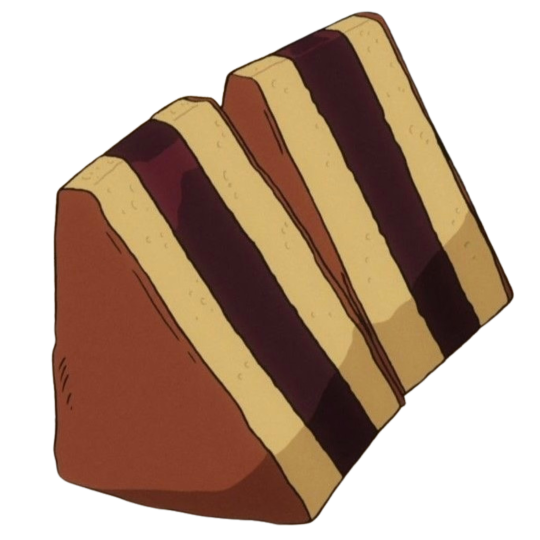
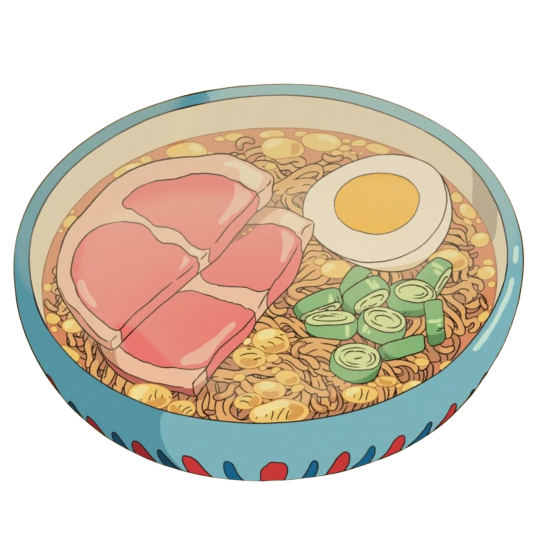


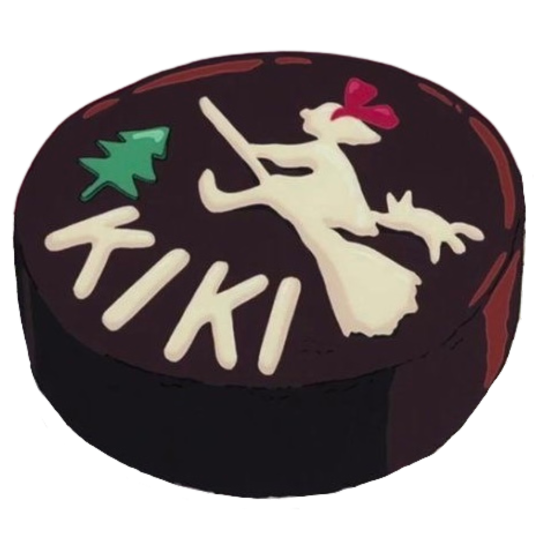



studio ghibli food pngs ! free to use! credit not needed but appreciated :)
478 notes
·
View notes
Text
youtube
yay new podcast episode
I tried listening Hanas podcast in winter but it was little too advanced. I neer to check if using text scrip feature will show the text, if it works it could be used for making new words list.
0 notes
Text

When anyone says my cat’s name (Yoshi) her tail shoots straight up, I had to animate it because this adorable creature needs to be immortalized in ART.
(Also behold my first animation)
77 notes
·
View notes




